Friends, if you’re seeking “Bible Verses About God Accepting Everyone,” this content is for you. Today, I share Bible verses that will help you better understand God’s inclusive love according to the Bible. These scriptures illuminate how God welcomes all people, regardless of their background or past. Let’s explore what the Word says about God’s acceptance and unconditional love for everyone.
God so loved the world that he gave his one and only Son, that whoever believes in him shall not perish but have eternal life.
Come to me, all you who are weary and burdened, and I will give you rest.
There is neither Jew nor Gentile, neither slave nor free, nor is there male and female, for you are all one in Christ Jesus.
For God does not show favoritism.
While we were still sinners, Christ died for us.
The Lord is not slow in keeping his promise, as some understand slowness. Instead he is patient with you, not wanting anyone to perish, but everyone to come to repentance.
Accept one another, then, just as Christ accepted you, in order to bring praise to God.
Here there is no Gentile or Jew, circumcised or uncircumcised, barbarian, Scythian, slave or free, but Christ is all, and is in all.
Contents
- 1 What Does the Bible Say About God’s Universal Love?
- 1.1 John 3:16 – God’s love offers eternal life to everyone
- 1.2 Romans 5:8 – God’s love shown through Christ’s sacrifice for sinners
- 1.3 1 John 4:9-10 – God’s love revealed through Christ’s sacrificial love
- 1.4 Ephesians 2:4-5 – God’s mercy and love bring life in Christ
- 1.5 Titus 3:4-5 – God’s mercy saves, not deeds
- 1.6 1 John 3:1 – God’s love makes us His children
- 2 Biblical Proof That God Shows No Favoritism
- 3 How Jesus Welcomed All People Regardless of Background
- 3.1 Matthew 11:28 – Jesus invites all who are weary to rest
- 3.2 Luke 15:1-2 – Jesus welcomes sinners and eats with them
- 3.3 John 6:37 – Jesus welcomes all who come to him
- 3.4 Mark 2:17 – Jesus welcomes sinners, not the righteous
- 3.5 Luke 19:10 – Jesus seeks and saves the lost
- 3.6 Matthew 9:10-13 – Jesus welcomes sinners, emphasizing mercy over sacrifice
- 3.7 John 4:9 – Jesus breaks barriers, welcoming all regardless of background
- 4 Old Testament Verses About God’s Inclusive Nature
- 4.1 Genesis 12:3 – All families blessed through Abraham
- 4.2 Isaiah 56:7 – God’s house welcomes all nations
- 4.3 Micah 4:2 – Nations gather, seeking God’s ways and instruction
- 4.4 Zechariah 2:11 – Many nations will join the Lord and be His people
- 4.5 Psalm 86:9 – All nations will worship and glorify God
- 4.6 Malachi 1:11 – God’s name honored among all nations
- 5 Does God Accept People from All Nations and Cultures?
- 6 Bible Verses About God’s Grace for Sinners and Outcasts
- 7 How God’s Acceptance Differs from Human Judgment
- 7.1 Isaiah 55:8-9 – God’s thoughts and ways exceed human understanding
- 7.2 1 Samuel 16:7 – God sees the heart, not outward appearance
- 7.3 James 4:12 – God alone judges, unlike human judgment
- 7.4 Romans 14:10 – God alone judges, not human opinions
- 7.5 Matthew 7:1-2 – God’s judgment surpasses human judgment
- 7.6 John 8:7 – Let the sinless cast the first stone
What Does the Bible Say About God’s Universal Love?
God’s love is like a gentle, ever-present embrace, welcoming us all without condition. No matter where you come from or what you’ve done, His love is constant and unwavering. It’s a comforting reminder that we are never alone and always valued. His universal love is a testament to the boundless grace that is offered to everyone, inviting us to draw closer and find solace in His presence.
John 3:16 – God’s love offers eternal life to everyone

For God so loved the world, that he gave his only begotten Son, that whosoever believeth in him should not perish, but have everlasting life
John 3:16
Explanation:- God’s love is boundless and inclusive, offering eternal life to all who believe. This verse highlights the universal nature of God’s love, emphasizing that salvation is available to everyone, regardless of background or status, through faith in Him.
Romans 5:8 – God’s love shown through Christ’s sacrifice for sinners

But God commendeth his love toward us, in that, while we were yet sinners, Christ died for us
Romans 5:8
Explanation:- This verse highlights God’s profound love by demonstrating that Christ’s sacrifice was for all humanity, even when we were undeserving sinners. It underscores the universal reach of God’s love and acceptance, emphasizing that His grace is available to everyone regardless of their past.
1 John 4:9-10 – God’s love revealed through Christ’s sacrificial love
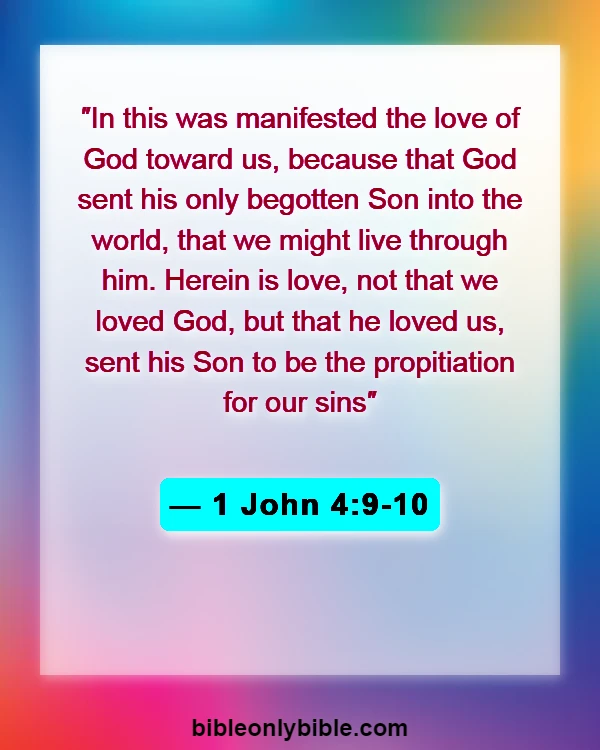
In this was manifested the love of God toward us, because that God sent his only begotten Son into the world, that we might live through himHerein is love, not that we loved God, but that he loved us, sent his Son to be the propitiation for our sins
1 John 4:9-10
Explanation:- This passage highlights God’s universal love by demonstrating His willingness to send His Son as a sacrifice for humanity’s sins. It underscores the depth of God’s love and acceptance, emphasizing that His love is inclusive and available to everyone through Christ’s redemptive act.
Ephesians 2:4-5 – God’s mercy and love bring life in Christ

But God, who is rich in mercy, for his great love wherewith he loved usEven when we were dead in sins, hath quickened us together with Christ, (by grace ye are saved;)
Ephesians 2:4-5
Explanation:- This passage highlights God’s immense mercy and love, emphasizing that He brings us to life through Christ despite our sins. It underscores God’s universal love, showing that His acceptance and grace extend to everyone, offering spiritual renewal and salvation.
Titus 3:4-5 – God’s mercy saves, not deeds
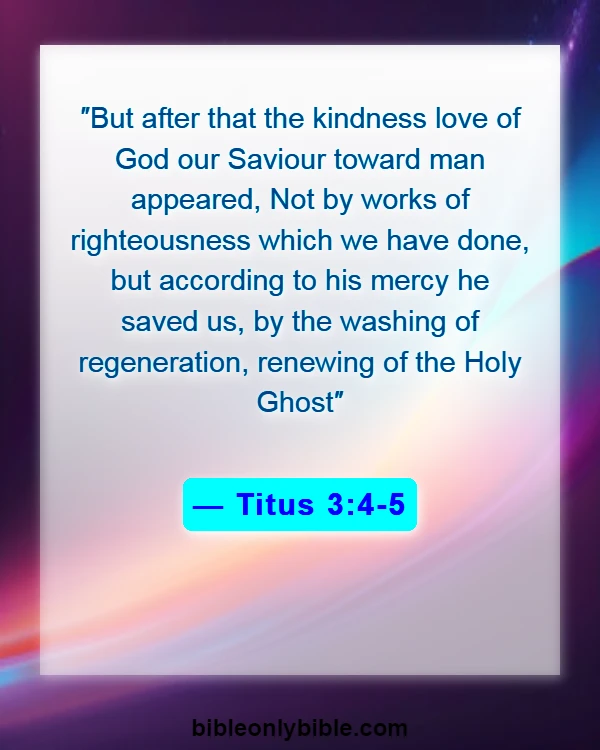
But after that the kindness love of God our Saviour toward man appearedNot by works of righteousness which we have done, but according to his mercy he saved us, by the washing of regeneration, renewing of the Holy Ghost
Titus 3:4-5
Explanation:- Titus 3:4-5 highlights God’s universal love and acceptance, emphasizing that salvation comes through His mercy and kindness, not our deeds. This underscores the idea that God’s grace is available to all, reflecting His desire to accept everyone without partiality.
1 John 3:1 – God’s love makes us His children
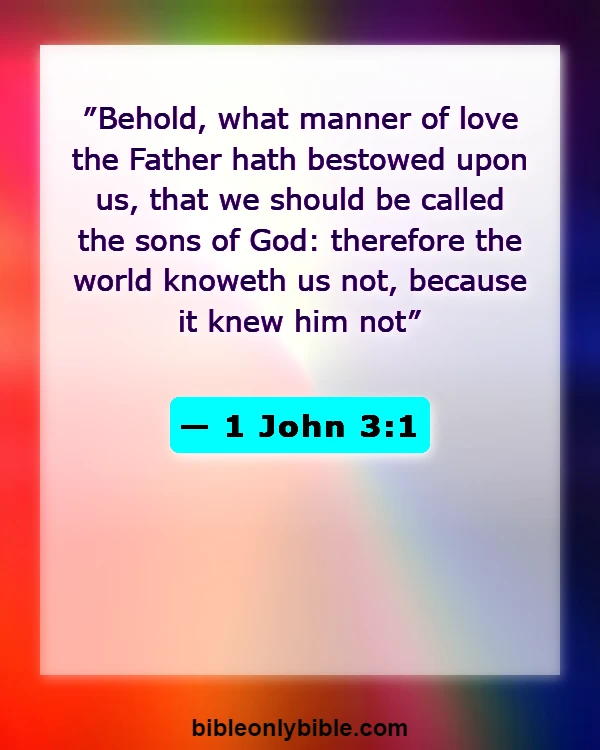
Behold, what manner of love the Father hath bestowed upon us, that we should be called the sons of God: therefore the world knoweth us not, because it knew him not
1 John 3:1
Explanation:- This verse highlights the immense love God has for us, making us His children. It reflects God’s universal love and acceptance, inviting everyone into His family. By recognizing our identity as God’s children, we understand the depth and inclusivity of His love.
Biblical Proof That God Shows No Favoritism
In a world that often judges by appearances, God’s love is refreshingly impartial. He sees beyond our earthly labels and distinctions, valuing each person equally. This divine fairness assures us that we can come to Him as we are, knowing that His acceptance is not based on status or achievement but on His infinite love for every soul.
Acts 10:34 – God shows no favoritism, accepts all people
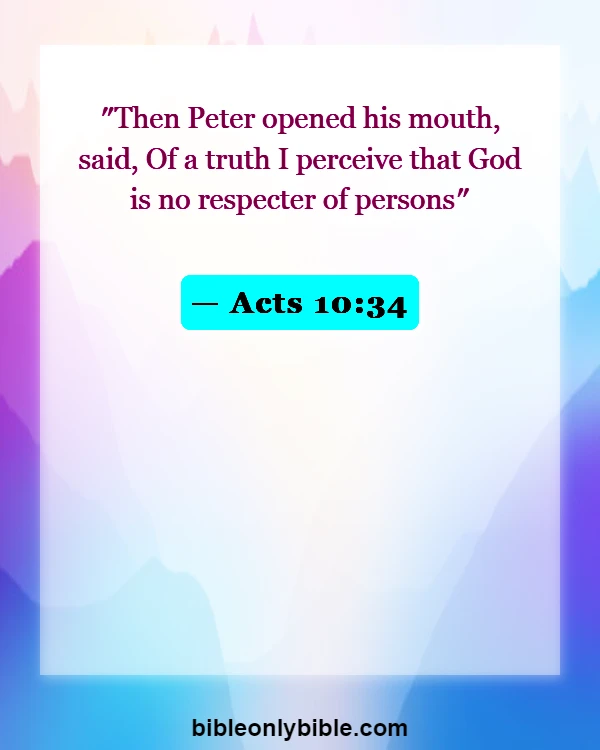
Then Peter opened his mouth, said, Of a truth I perceive that God is no respecter of persons
Acts 10:34
Explanation:- In this verse, Peter acknowledges that God does not show favoritism and accepts people from every nation who fear Him and do what is right. This highlights the inclusive nature of God’s love, emphasizing that His grace and acceptance are available to all, regardless of background or ethnicity.
Romans 2:11 – God shows no favoritism or partiality
For there is no respect of persons with God
Romans 2:11
Explanation:- This verse highlights God’s impartial nature, affirming that He judges and loves all individuals equally, regardless of their background or status. It reassures believers that God’s justice and love are universal, encouraging a sense of equality and unity among all people.
Galatians 3:28 – All are one in Christ Jesus
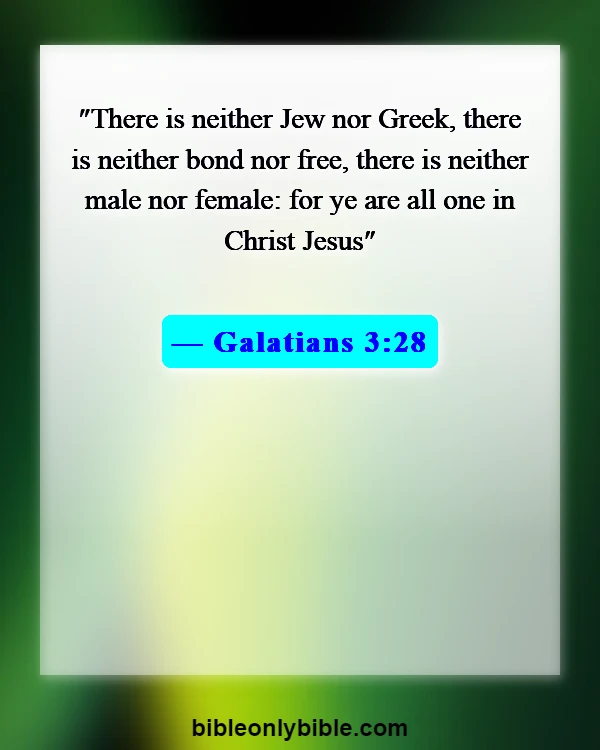
There is neither Jew nor Greek, there is neither bond nor free, there is neither male nor female: for ye are all one in Christ Jesus
Galatians 3:28
Explanation:- This verse underscores the unity and equality of all believers in Christ, transcending distinctions like ethnicity, social status, and gender. It affirms that in God’s eyes, everyone is accepted and valued equally, highlighting the absence of favoritism in His love and grace.
Colossians 3:11 – Christ unites all, no distinctions among people
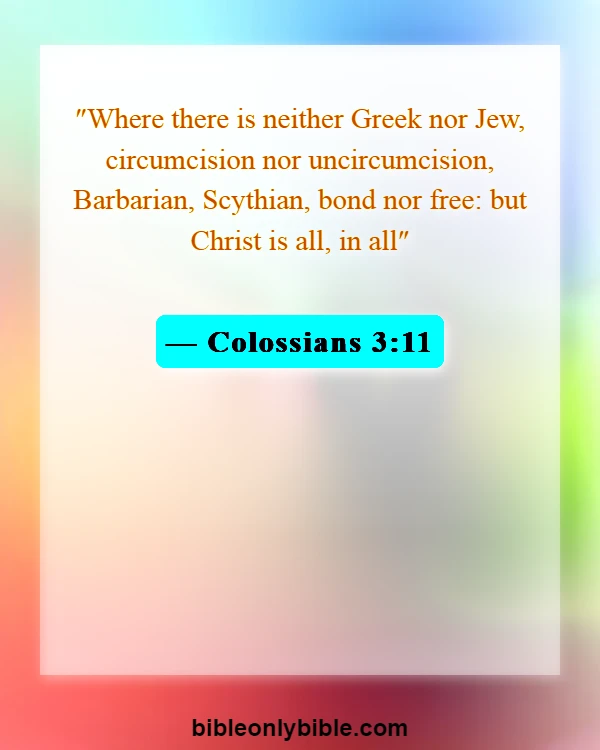
Where there is neither Greek nor Jew, circumcision nor uncircumcision, Barbarian, Scythian, bond nor free: but Christ is all, in all
Colossians 3:11
Explanation:- Colossians 3:11 emphasizes that in Christ, all differences among people vanish. Regardless of ethnicity, social status, or background, everyone is equal and accepted in God’s eyes. This verse highlights God’s impartiality and the unity found in Christ, affirming His acceptance of all.
James 2:1 – Faith in Christ shows no favoritism
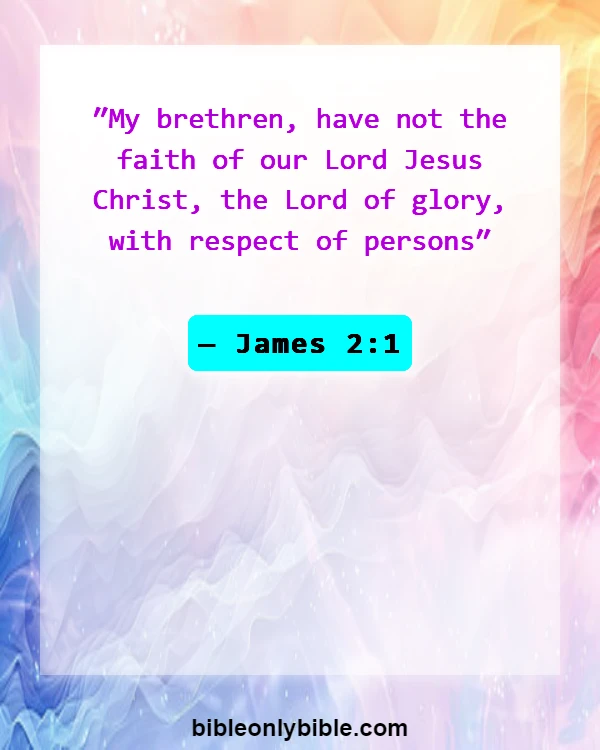
My brethren, have not the faith of our Lord Jesus Christ, the Lord of glory, with respect of persons
James 2:1
Explanation:- This verse underscores that true faith in Jesus Christ requires treating everyone equally, without favoritism or discrimination. It highlights the Christian principle that God values all individuals equally, urging believers to reflect this divine impartiality in their relationships and interactions.
How Jesus Welcomed All People Regardless of Background
Jesus’ life and ministry were a powerful demonstration of inclusive love. He reached out to those society shunned, breaking barriers and embracing all with compassion. His actions teach us that no matter our past or present, we are worthy of His love and grace. Jesus’ welcoming heart invites us to model the same acceptance and kindness in our own lives.
Matthew 11:28 – Jesus invites all who are weary to rest

Come unto me, all ye that labour are heavy laden, I will give you rest
Matthew 11:28
Explanation:- Jesus extends an open invitation to everyone burdened by life’s challenges, offering them rest and comfort. His message is one of inclusivity, welcoming people from all walks of life to find solace and acceptance in his embrace, demonstrating God’s unconditional love for all.
Luke 15:1-2 – Jesus welcomes sinners and eats with them
Then drew near unto him all the publicans sinners for to hear himAnd the Pharisees scribes murmured, saying, This man receiveth sinners, eateth with them
Luke 15:1-2
Explanation:- In this passage, Jesus is criticized for associating with sinners, illustrating his inclusive nature and God’s love for all individuals, regardless of their past. It highlights the message that everyone is welcome in God’s kingdom, emphasizing acceptance and compassion.
John 6:37 – Jesus welcomes all who come to him

All that the Father giveth me shall come to me; him that cometh to me I will in no wise cast out
John 6:37
Explanation:- This verse highlights Jesus’ open invitation to everyone, regardless of their past or background, assuring us that anyone who seeks Him will not be turned away. It emphasizes the inclusive and accepting nature of Jesus’ love and grace.
Mark 2:17 – Jesus welcomes sinners, not the righteous
When Jesus heard it, he saith unto them, They that are whole have no need of the physician, but they that are sick: I came not to call the righteous, but sinners to repentance
Mark 2:17
Explanation:- In this verse, Jesus highlights his mission to reach those who are spiritually in need. He emphasizes that his message is for those who recognize their own shortcomings, illustrating God’s inclusive love and acceptance of all, regardless of their past or background.
Luke 19:10 – Jesus seeks and saves the lost

For the Son of man is come to seek to save that which was lost
Luke 19:10
Explanation:- This verse illustrates Jesus’ mission to reach out to everyone, regardless of their background or past mistakes. It highlights His inclusive love and compassion, showing that He actively seeks out the lost and offers them salvation, emphasizing that no one is beyond His reach.
Matthew 9:10-13 – Jesus welcomes sinners, emphasizing mercy over sacrifice
It came to pass, as Jesus sat at meat in the house, behold, many publicans sinners came sat down with him his disciplesAnd when the Pharisees saw it, they said unto his disciples, Why eateth your Master with publicans sinners?But when Jesus heard that, he said unto them, They that be whole need not a physician, but they that are sickBut go ye learn what that meaneth, I will have mercy, not sacrifice: for I am not come to call the righteous, but sinners to repentance
Matthew 9:10-13
Explanation:- In Matthew 9:10-13, Jesus dines with tax collectors and sinners, illustrating His inclusive love. He teaches that mercy and compassion are more important than ritual sacrifice, highlighting God’s acceptance of all people, regardless of their past or societal status.
John 4:9 – Jesus breaks barriers, welcoming all regardless of background
Then saith the woman of Samaria unto him, How is it that thou, being a Jew, askest drink of me, which am a woman of Samaria? for the Jews have no dealings with the Samaritans
John 4:9
Explanation:- In John 4:9, Jesus engages with a Samaritan woman, defying cultural norms and prejudices of His time. This interaction demonstrates His acceptance and love for all, regardless of their background, and highlights His mission to break down barriers and extend God’s grace to everyone.
Old Testament Verses About God’s Inclusive Nature
Even in ancient times, God’s inclusive nature was evident. He extended His covenant and blessings beyond Israel, showing care for all nations. These passages remind us that God’s love and promises are not limited by borders or heritage, offering hope and belonging to everyone who seeks Him with an open heart.
Genesis 12:3 – All families blessed through Abraham

I will bless them that bless thee, curse him that curseth thee: in thee shall all families of the earth be blessed
Genesis 12:3
Explanation:- This verse highlights God’s inclusive nature by promising that all families on earth will be blessed through Abraham. It underscores the idea that God’s blessings and love extend to everyone, transcending ethnic and cultural boundaries to embrace all humanity.
Isaiah 56:7 – God’s house welcomes all nations
Even them will I bring to my holy mountain, make them joyful in my house of prayer: their burnt offerings their sacrifices shall be accepted upon mine altar; for mine house shall be called an house of prayer for all people
Isaiah 56:7
Explanation:- Isaiah 56:7 highlights God’s inclusive nature, emphasizing that His house is open to people from all nations. It underscores the idea that God welcomes everyone, regardless of their background, into a community of worship and prayer, reflecting His universal love and acceptance.
Micah 4:2 – Nations gather, seeking God’s ways and instruction
Many nations shall come, say, Come, let us go up to the mountain of the Lord , to the house of the God of Jacob; he will teach us of his ways, we will walk in his paths: for the law shall go forth of Zion, the word of the Lord from Jerusalem
Micah 4:2
Explanation:- This verse highlights God’s inclusive nature as people from all nations come together to seek divine guidance and instruction. It underscores the idea that God’s wisdom and teachings are accessible to everyone, fostering a sense of unity and acceptance among diverse groups.
Zechariah 2:11 – Many nations will join the Lord and be His people
Many nations shall be joined to the Lord in that day, shall be my people: I will dwell in the midst of thee, thou shalt know that the Lord of hosts hath sent me unto thee
Zechariah 2:11
Explanation:- This verse highlights God’s inclusive nature, revealing that His love and salvation extend beyond Israel to all nations. It underscores the promise that diverse peoples will unite under God, becoming His people, demonstrating His welcoming and all-encompassing embrace.
Psalm 86:9 – All nations will worship and glorify God
All nations whom thou hast made shall come worship before thee, O Lord; shall glorify thy name
Psalm 86:9
Explanation:- This verse highlights the universal nature of God’s love and acceptance. It envisions a future where people from all nations come together to worship and honor God, reflecting His inclusive nature and the ultimate unity of humanity under His divine presence.
Malachi 1:11 – God’s name honored among all nations
For from the rising of the sun even unto the going down of the same my name shall be great among the Gentiles; in every place incense shall be offered unto my name, a pure offering: for my name shall be great among the heathen, saith the Lord of hosts
Malachi 1:11
Explanation:- This verse highlights God’s inclusive nature, showing that His name will be revered among all nations. It underscores the universal reach of God’s love and acceptance, emphasizing that worship and honor will come from people everywhere, transcending cultural and geographical boundaries.
Does God Accept People from All Nations and Cultures?
God’s kingdom is as diverse as His creation, welcoming people from every nation and culture. This divine inclusivity is a beautiful reflection of His love that transcends human boundaries. It assures us that no matter our language or customs, we are invited to be part of His family, united by faith and love.
Revelation 7:9 – God welcomes all nations, tribes, peoples, and languages
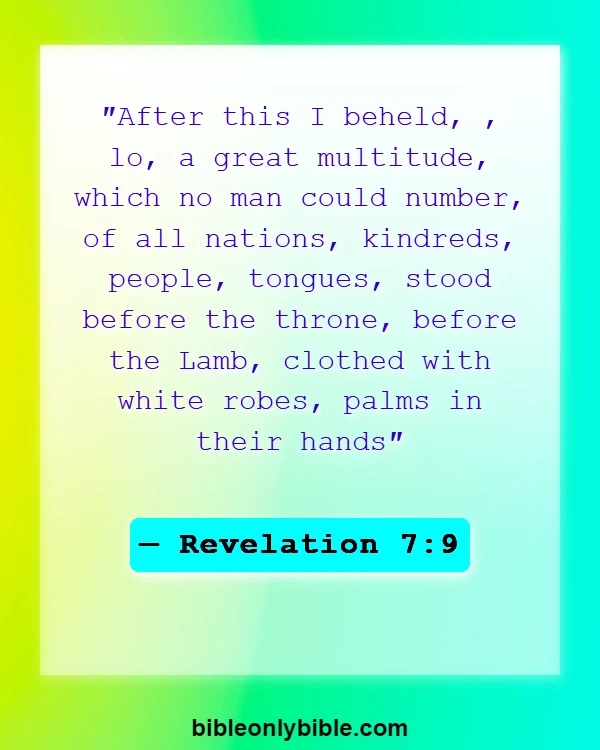
After this I beheld, , lo, a great multitude, which no man could number, of all nations, kindreds, people, tongues, stood before the throne, before the Lamb, clothed with white robes, palms in their hands
Revelation 7:9
Explanation:- This verse beautifully illustrates God’s inclusive love, depicting a vision of people from every nation, tribe, and language united in worship. It reassures us that God’s acceptance transcends cultural and ethnic boundaries, welcoming all into His presence and affirming the diversity of His creation.
Acts 17:26-27 – God created all nations to seek Him
Hath made of one blood all nations of men for to dwell on all the face of the earth, hath determined the times before appointed, the bounds of their habitationThat they should seek the Lord, if haply they might feel after him, find him, though he be not far from every one of us
Acts 17:26-27
Explanation:- In Acts 17:26-27, we learn that God created all nations and cultures with the intention that they would seek and find Him. This passage highlights God’s universal desire for relationship with everyone, affirming that His acceptance transcends all ethnic and cultural boundaries.
Ephesians 2:14 – Christ unites, breaking down walls of division
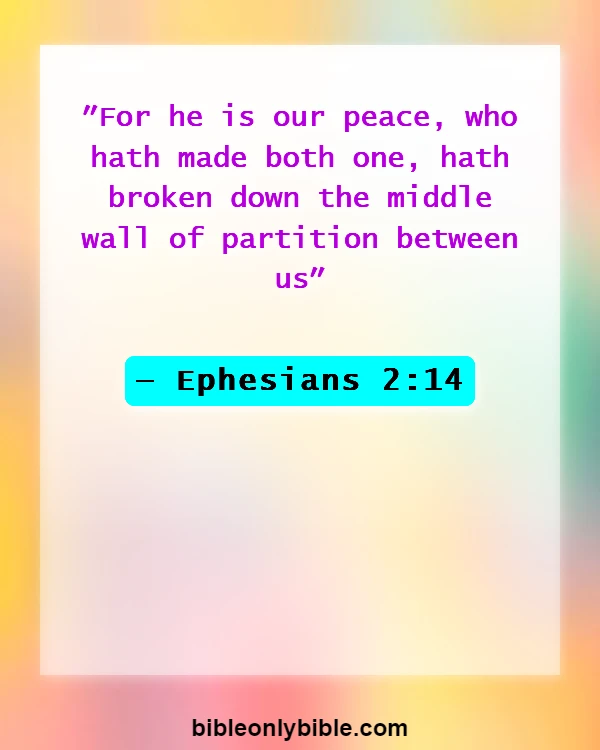
For he is our peace, who hath made both one, hath broken down the middle wall of partition between us
Ephesians 2:14
Explanation:- Christ acts as a unifying force, dismantling barriers between different peoples and cultures. Through His sacrifice, He eliminates divisions, promoting peace and acceptance among all nations. This demonstrates God’s inclusive love, welcoming everyone into His family regardless of background.
Matthew 28:19 – God accepts and commands discipleship for all nations

Go ye therefore, teach all nations, baptizing them in the name of the Father, of the Son, of the Holy Ghost
Matthew 28:19
Explanation:- This verse highlights the inclusivity of God’s love and mission. It underscores the call to make disciples of all nations, showing that God’s acceptance transcends cultural and geographical boundaries, inviting everyone into a relationship with Him through faith and discipleship.
Bible Verses About God’s Grace for Sinners and Outcasts
God’s grace is a healing balm for those who feel unworthy or cast aside. He offers forgiveness and restoration, transforming lives with His boundless mercy. These verses remind us that no one is too far gone for His love. In our brokenness, we find His acceptance, and through His grace, we are made whole.
Romans 5:20 – Grace abounds more where sin increases
Moreover the law entered, that the offence might abound. But where sin abounded, grace did much more abound
Romans 5:20
Explanation:- Romans 5:20 highlights the abundance of God’s grace, emphasizing that no matter how great our sin, God’s grace is even greater. This assures us that God accepts everyone, offering love and forgiveness to all, including sinners and outcasts.
1 Timothy 1:15 – Christ came to save sinners, offering grace

This is a faithful saying, worthy of all acceptation, that Christ Jesus came into the world to save sinners; of whom I am chief
1 Timothy 1:15
Explanation:- This verse highlights the core message of God’s grace and acceptance. It reassures us that Christ’s mission was to save sinners, demonstrating that no one is beyond the reach of His love and forgiveness. This truth offers hope and inclusion to all.
Matthew 9:12-13 – Jesus calls sinners, not the righteous
But when Jesus heard that, he said unto them, They that be whole need not a physician, but they that are sickBut go ye learn what that meaneth, I will have mercy, not sacrifice: for I am not come to call the righteous, but sinners to repentance
Matthew 9:12-13
Explanation:- In this passage, Jesus emphasizes that His mission is to reach out to sinners and those marginalized by society. He highlights God’s grace and acceptance for all, especially those who acknowledge their need for healing and redemption, rather than the self-righteous.
Luke 15:7 – Joy in heaven over one sinner who repents
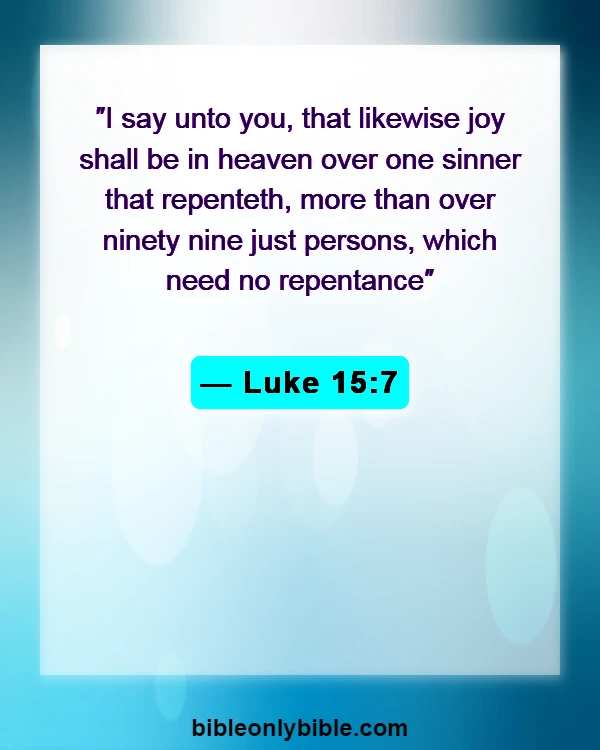
I say unto you, that likewise joy shall be in heaven over one sinner that repenteth, more than over ninety nine just persons, which need no repentance
Luke 15:7
Explanation:- This verse highlights the immense joy in heaven when a sinner repents. It underscores God’s grace and acceptance, emphasizing that every individual, regardless of their past, is embraced by God’s love and mercy when they turn towards Him.
How God’s Acceptance Differs from Human Judgment
While human judgment can be harsh and unforgiving, God’s acceptance is rooted in love and understanding. He sees beyond our flaws, offering compassion and grace. This divine perspective challenges us to look at others through the lens of love, striving to reflect His kindness and mercy in our interactions with the world.
Isaiah 55:8-9 – God’s thoughts and ways exceed human understanding

For my thoughts are not your thoughts, neither are your ways my ways, saith the LordFor as the heavens are higher than the earth, so are my ways higher than your ways, my thoughts than your thoughts
Isaiah 55:8-9
Explanation:- Isaiah 55:8-9 highlights how God’s understanding and acceptance surpass human judgment. While humans often judge based on limited perspectives, God’s thoughts and ways are infinitely higher, offering a more profound, inclusive acceptance that transcends our comprehension.
1 Samuel 16:7 – God sees the heart, not outward appearance
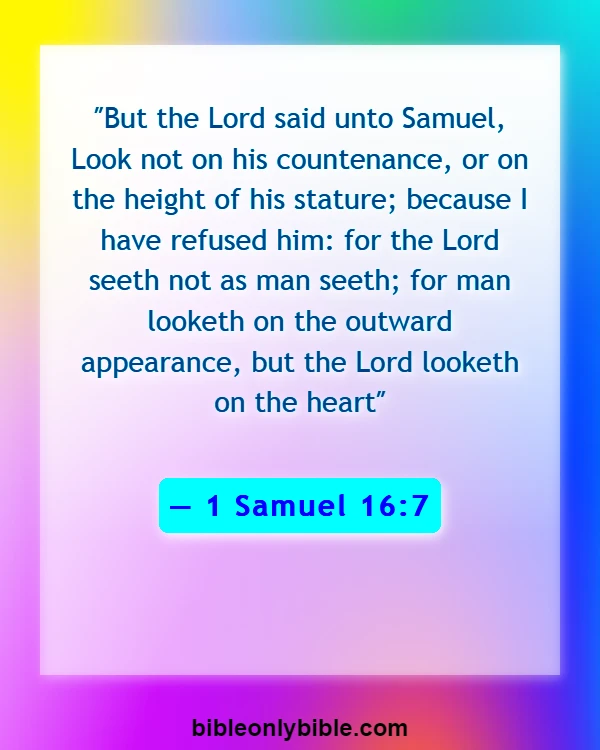
But the Lord said unto Samuel, Look not on his countenance, or on the height of his stature; because I have refused him: for the Lord seeth not as man seeth; for man looketh on the outward appearance, but the Lord looketh on the heart
1 Samuel 16:7
Explanation:- This verse highlights that God’s acceptance is based on the heart rather than outward appearances. While humans often judge by looks or status, God values inner qualities. This teaches us the importance of cultivating a sincere and genuine heart, reflecting true character.
James 4:12 – God alone judges, unlike human judgment

There is one lawgiver, who is able to save to destroy: who art thou that judgest another?
James 4:12
Explanation:- God’s acceptance transcends human judgment, as only He possesses the ultimate authority to judge. Unlike humans, whose judgments are often flawed and biased, God’s judgment is perfect and just. This underscores the importance of humility and reliance on God’s wisdom.
Romans 14:10 – God alone judges, not human opinions
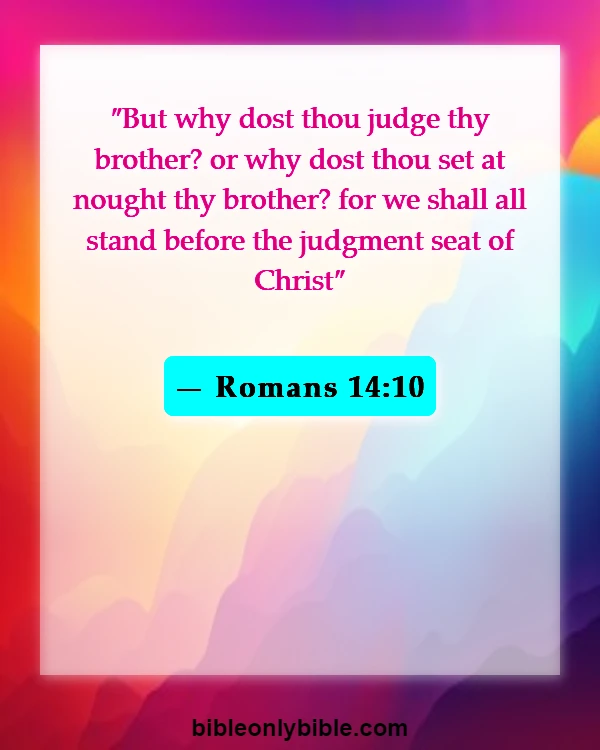
But why dost thou judge thy brother? or why dost thou set at nought thy brother? for we shall all stand before the judgment seat of Christ
Romans 14:10
Explanation:- God alone holds the authority to judge each person, highlighting the importance of divine acceptance over human judgment. While humans often judge based on limited understanding, God’s acceptance transcends human biases, reminding us to embrace others without prejudice, reflecting His inclusive love.
Matthew 7:1-2 – God’s judgment surpasses human judgment

Judge not, that ye be not judgedFor with what judgment ye judge, ye shall be judged: with what measure ye mete, it shall be measured to you again
Matthew 7:1-2
Explanation:- Matthew 7:1-2 highlights the difference between divine and human judgment. While humans often judge harshly and unfairly, God’s judgment is just and compassionate. This passage encourages us to reflect on our own biases and strive for understanding and acceptance, as God does.
John 8:7 – Let the sinless cast the first stone

So when they continued asking him, he lifted up himself, said unto them, He that is without sin among you, let him first cast a stone at her
John 8:7
Explanation:- This verse highlights the contrast between divine acceptance and human judgment. It reminds us that everyone has faults and encourages us to reflect on our own imperfections before judging others, illustrating God’s inclusive and compassionate nature, which transcends human biases and prejudices.
